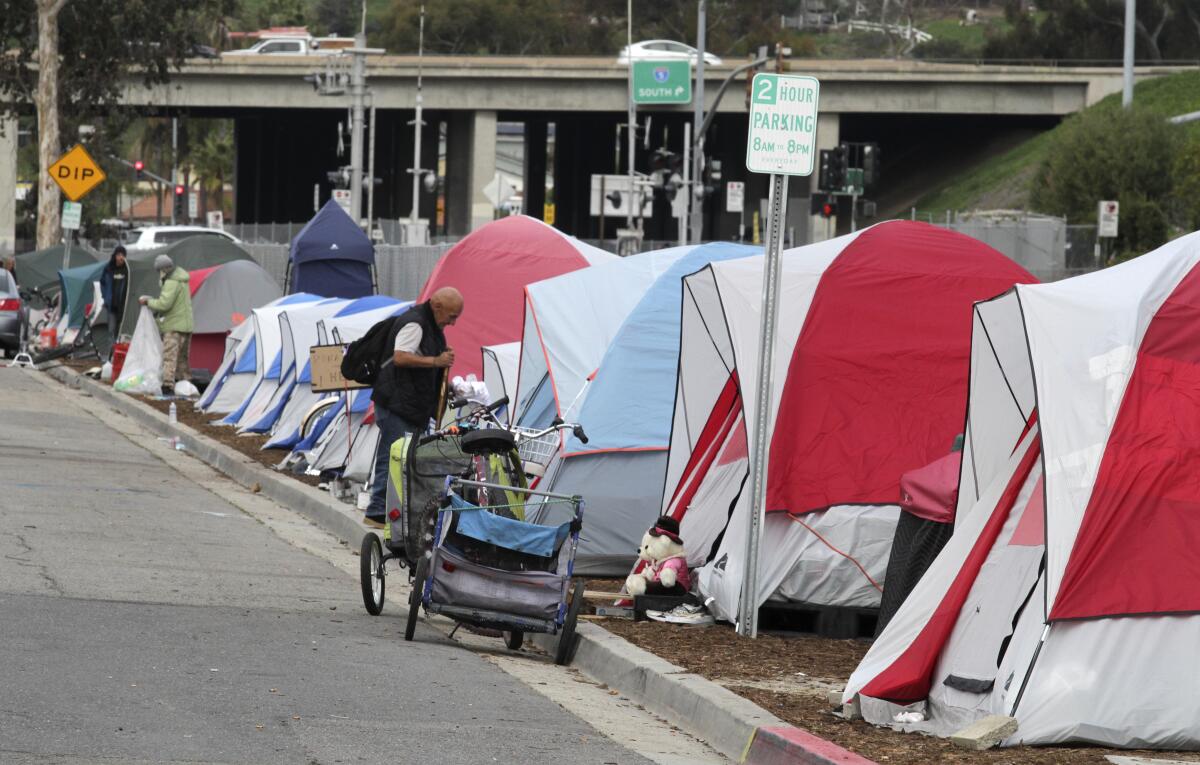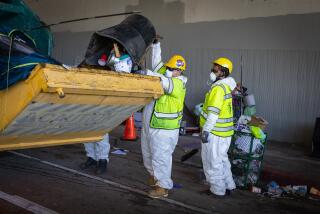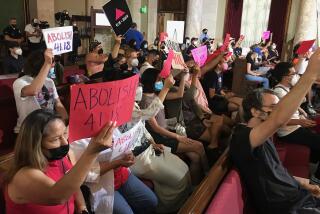Oceanside approves emergency measures to clean up homeless camps

Motel vouchers, anti-camping law aimed at growing tent communities
The Oceanside City Council unanimously approved an emergency motel voucher program and an anti-camping ordinance this week, both effective immediately and aimed at the tent communities growing along South Oceanside Boulevard and elsewhere.
The two actions are designed to work together, staff members said. If the city can offer homeless individuals an available bed and support services, it can ticket them for “camping, sleeping, sitting, lying and storing personal property” in public places if they refuse to leave.
Posting of the required 48-hour notices began at the camps Thursday morning, City Manager Deanna Lorson said by email.
“There will be no criminal citations issued until the person has been offered shelter and/or a motel voucher,” she said. The city’s homeless outreach team, a combination of police officers and social workers, will offer an array of housing options and other services to the individuals.
“The program objective is to assist the homeless and alleviate community impacts,” said Megan Crooks, interim neighborhood services director, before the City Council’s vote Wednesday. “This is a temporary lodging solution.... The idea is to find permanent solutions for the individuals.”
Oceanside residents and business leaders widely praised the effort, calling it much needed and a step in the right direction. A few people, including some homeless camp occupants who called in to the council meeting by telephone, said the effort was misguided and insufficient.
“This is not dignified, this is coercion,” said Nicholas Webber, an advocate who volunteers to help homeless people.
Another advocate said homeless individuals fear that they won’t be allowed to have visitors in their motel rooms and that smoking will be prohibited on the properties. She compared the motels to “solitary confinement.” A homeless man who called in said the city’s actions are “just a Band-Aid on a gushing bullet wound.”
Another caller, Chip Steel, said he was 34 years old, had been homeless for six years, and was a victim of “a lot of violence,” including a recent beating.
“A lot of us out here on the street have mental issues,” he said, and they choose to live outdoors with a community of like-minded people, although crime and drugs are rampant.
Most residents and business people called the city’s effort a good start.
“The actions you are considering tonight are a demonstration of true compassion,” said Scott Ashton, chief executive of the Oceanside Chamber of Commerce. He said the program will help get the unsheltered “on the path toward wellness.”
“Thanks for working together to find humane solutions,” said Leslee Gaul, chief executive of Visit Oceanside, which represents the area’s hospitality industry. “Many of our homeless have reached the point where they are not able to improve their situation without support or intervention.”
Another caller, Joshua Youngerman, said the temporary assistance is good, but the city needs to take a more long-term view.
Homelessness often stems from drug addition, and the city has done little to address that issue, Youngerman said. Instead, the city has legalized marijuana businesses and is contributing to their expansion.
“We are putting money toward access to marijuana, when we should be putting money toward homelessness,” Youngerman said.
Several people said the shopping centers nearest the homeless camps have suffered. Marc Eynon, who lives in nearby Fire Mountain, said that while eating lunch at a nearby fast-food restaurant he’s seen drug deals, prostitution and aggressive panhandlers, and many people will no longer go there.
“It’s a serious problem,” Eynon said. “We need to do something about this.”
Council Member Peter Weiss said that he would support the city’s actions, but that after talking with some of the homeless residents and their advocates, he realized some of them may not want any help.
“They choose to live in those circumstances,” Weiss said. “We may not understand it, but they do.”
He suggested the city provide a secure site with sanitation facilities and other services for homeless people who choose to live in tents. Council Member Kori Jensen said she agreed with the idea.
“Maybe a tiny-home village or a project like that for people who just don’t want help, or who are happy in their current situation,” Jensen said. “That could be an option as well.”
Mayor Esther Sanchez disagreed, saying the city has committed $8 million to long-term efforts such as building low-income housing, securing temporary shelters, creating the Police Department’s homeless outreach team and other services to help people get off the streets.
“It is not a healthy situation to be in encampments,” Sanchez said. “I would like to have no encampments in Oceanside.”
Homelessness is not a crime, “nor should it be,” said Council Member Ryan Keim.
“Our goal is to assist people in moving forward,” Keim said. “We need to have some tool to push and encourage these people to get some help; that’s the spirit of this.”
Council Member Christopher Rodriguez said that homelessness is not a crime, but that homeless people must obey the laws.
“We are a society of law and order,” Rodriguez said. “They need to get off the street and into a warm, cozy bed and ... if they don’t want that, we can agree to disagree.”
The South Oceanside Boulevard tent camp has received increasing attention since about February, when one of the residents there, Rodney McGough, began organizing an effort to keep the area clean. Since then, the camp’s population has steadily grown, along with calls for the city to do something about the situation.
The six-month voucher program is expected to cost $632,630. About $600,000 of the money will initially be taken from the city’s general fund, but most of the money could be reimbursed by federal and state grants.
McAlister Institute, which runs the North Coastal Regional Recovery Center in Oceanside, will oversee the voucher program under a contract not to exceed $95,000. McAlister will screen clients and monitor room cleanliness, personal hygiene and the health of participants.
The city plans to lease up to 30 motel rooms in blocks of 10, and individuals referred to the program could stay there for up to about three weeks at a time. Meals suitable to the dietary needs of participants will be delivered from restaurants and grocery delis.
On-site staff will work with clients to ensure they follow the rules and to help them enter long-term housing. Any individuals who fail to follow the rules will be required to leave.
The anti-camping ordinance adopted by the council amends an earlier chapter of the city’s municipal code regarding illegal encampments. The new ordinance was written to comply with a court ruling in the case of Martin v. City of Boise, which concluded that a city can’t prohibit sleeping in a public place when there is no space available in a shelter.
The new ordinance also prohibits sitting or lying on public sidewalks in any way that obstructs pedestrians or blocks vehicular traffic.
Camping on private property is prohibited without the written consent of the property owner.
The most recent annual countywide point-in-time count showed Oceanside had 242 unsheltered individuals, though the number varies widely according to the season, sources and other circumstances.
Diehl writes for the San Diego Union-Tribune.
More to Read
Start your day right
Sign up for Essential California for news, features and recommendations from the L.A. Times and beyond in your inbox six days a week.
You may occasionally receive promotional content from the Los Angeles Times.







